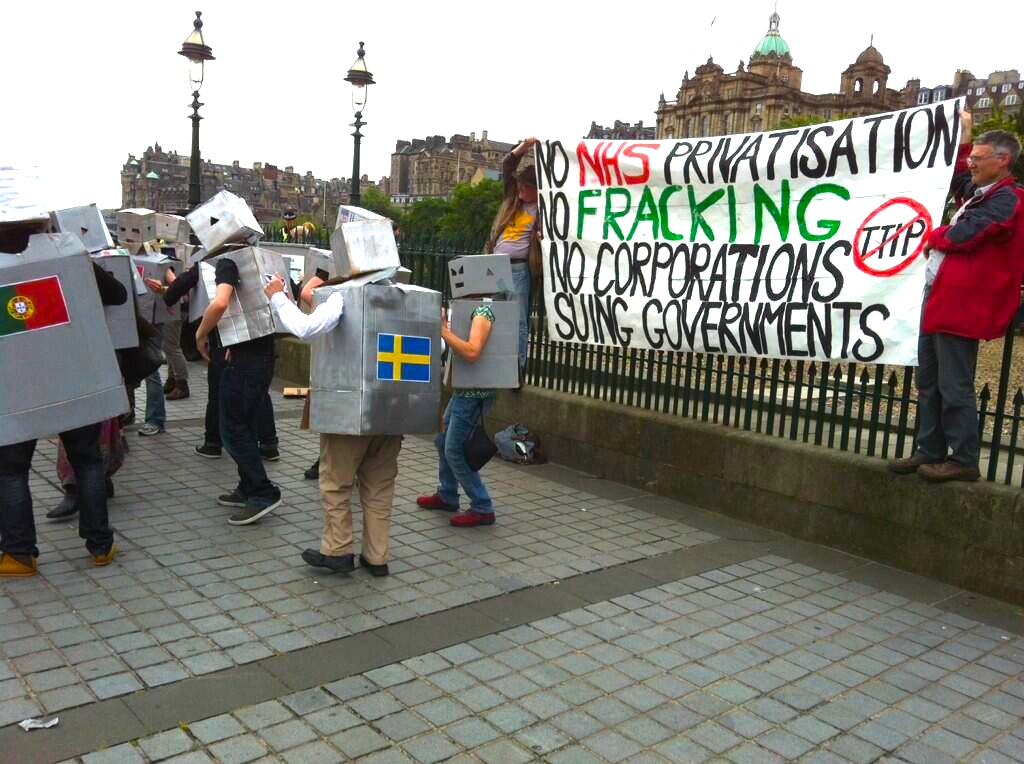“The Transatlantic Trade and Investment Partnership is a corporate declaration of war against democracy – the corporate lobby’s arrogance is shocking, thinking they can win this battle over sovereignty,” said Occupy London supporter Vica Rogers during Britain’s national day of action Saturday outside London’s European Union building.
The United States and European Union will resume negotiations this week on the highly controversial TTIP deal. The secret, corporate-led talks aim to override national laws and regulations under the auspices of "free trade."
Britain’s first national organized action against the treaty comes after mass arrests and water cannons were used to disperse TTIP protests in Brussels in May.
Nationwide Protests
Dozens of actions, many of them theatrical, filled Britain’s streets on Saturday. Brighton saw big business beat up citizens’ rights in a boxing match. Manchester held a faux-auction selling off public services and commons. Meanwhile, in Edinburgh, a flash-mob representing the E.U. countries danced while dressed as corporate robots. Worker puppets controlled by business was an overarching theme of Saturday's actions – like in London, where a giant business man on stilts controlled a nurse.
Stopping the TTIP deal has united unions, activists, campaigners and NGOs across the spectrum. Among the dangers of the partnership, the TTIP threatens to weaken banking regulations, increase the power of big pharma, strengthen corporate agro-business and overall favor transnational corporate interests over community or even national interests.
The TTIP will accelerate the privatization of public services, threatening universal healthcare and state school provisions. At the same time, it will weaken the power of unions and further quash peoples’ personal privacy. Not to mention that GMO crops under the deal would be easier to sell, and corporate fracking interests would face weakened national laws able to resist them.
Attacking Regulation
Under the quietly designed TTIP deal, national laws would be diluted through "harmonization," another way of saying: cutting regulations to the lowest common denominator. For instance, international banks could work in the U.S. under E.U. rules that allow far riskier banking, while food companies may apply U.S. rules so they can dodge anti-GMO legislation.
In particular, “Investor-state dispute settlement (ISDS) will elevate corporations to the level of governments to sue them against our public safeguards and demand billions of dollars,” said Melinda St. Louis at a workshop during the London event.
St. Louis is director of international campaigns for the Washington, D.C.-based Global Trade Watch, which has fought hard to kill the TTIP's partner agreement in Asia and the Americas called the Trans-Pacific Partnership (TPP). St. Louis believes campaigning to stop the ISDS alone may kill the overall trade agreement.
“U.S. corporations will not allow the agreement to go ahead without ISDS, as they do not want to set a precedent of any trade agreements without it,” she said.
ISDS has enabled companies to sue for lost profits through NAFTA and other bilateral trade agreements, she added. Some egregious cases of corporations suing countries include:
-
Tobacco companies suing Uruguay and Australia for their anti-smoking legislation.
-
U.S. firm Lone Pine Resources suing Canada over Quebec’s moratorium on fracking.
-
Canadian mining firm Infinito Gold suing Costa Rica for refusing to allow an open pit gold mine in its rainforest.
-
Veolia suing Egypt for raising its minimum wage.
-
In addition, Canada's tar sands industry is considering suing the U.S. for its delay building the Keystone XL pipeline.
St. Louis said corporate lawyers often rotate between judging and pushing for these and other corporate cases – by which they actively seek incentives to find countries guilty of hampering corporate freedoms. I asked her whether there are limits on what ISDS courts could consider – for instance, could an arms company sue a country for pulling out of a war?
“We have seen an explosion in the number of these cases, so for the corporate lawyers I think the sky is the limit,” St. Louis said.
Secrecy in the Talks
Leaks and whistleblowers have been essential for the public's understanding of the Transatlantic Trade and Investment Partnership and other free trade treaties, since participants in the talks aren't even allowed to remove documents from rooms, let alone discuss the contents. St. Louis said the same secrecy has enveloped the Trans-Pacific Partnership (TPP) talks that have been in negotiations for four years.
“The 11 TPP countries signed a memorandum that they cannot reveal the text until four years after it is concluded, contradicting Obama’s claims to be the most open government in history,” she added.
Activist and anthropologist David Graeber, who participated in Saturday's action, asserted that corporate secrecy was a key factor in organizers' efforts to undermine the TTIP. I interviewed Graeber as the protest was closing down Parliament Square, before it moved on to the European Council building.
“Corporations continually try this trick [of secrecy] with free-trade agreements,” Graeber said. He referred back to the World Trade Organization (WTO) and other free trade agreements that were halted by the anti-globalization movement once the facts were released from behind closed doors.
“Each time they just make it more secretive as these treaties shrivel when they hit the light of day: like vampires. To stop them it's best to ask to see the treaties," he continued, because "this puts governments in the difficult position of refusing to tell us [see] the laws that will govern us.”
Free Trade: A Global Takeover
But the TTIP and TPP are not alone. Another big treaty being weighed is the Trade in Services Agreement, or TISA.
Nick Dearden, director of the World Development Movement, tells me that “TISA is a turbo-charged private service agreement that threatens services from finance right through to the public’s right to control health, education, other services – plus energy prices.”
As a group, these trade agreements have been said to be a "blueprint for the world," with majority world countries, or developing countries, bound to either accept the principles or not trade with the E.U. and U.S..
I asked Dearden whether the agreements will work in unison; for instance, would weak laws from one region be able to spread through the U.S. to another. An example might be weak banking regulations shifting from Europe to the U.S. via the TTIP, then to Asia via the TPP.
“Yes, that is globalization’s nature," he said. "Just as we’ve seen it create sweatshops in Bangladesh and China, these treaties will further hit U.S. workers' rights and [then] migrate to Europe.”
A Counter-Movement to Fight Back?
The scale of threats posed by the TTIP brought many diverse campaigns together into the action, which will be ongoing through the week.
Saoirsi Fitzpatrick, coordinator of the Students Stop AIDS Campaign, told me the TTIP would prevent the sale of generic drugs. “Healthcare around the world depends on them – they are 80% cheaper,” Fitzpatrick said.
Sarah-Jane Clifton, director of the Jubilee Debt Campaign, spoke about how the TTIP would amplify vulture funds like Elliot Management, which just won a court case forcing Argentina to pay $1.3 billion of its debts incurred during the military dictatorship.
Meanwhile, Jim Killock, executive director of Open Rights explained that the TTIP would mean corporations could own a person’s personal information with more legality than the individual themselves.
The growing anti-TTIP movement is building towards a European-wide day of action on October 11, with Occupy London one of the initial signatories. For the event, Friends of the Earth will unveil a 12-meter Trojan horse in Brussels that will tour the continent drawing attention to the "Trojan Treaties."
Amid the new wave of anti-globalization, I asked Graeber why he thought the first wave – aimed initially against the WTO – drifted apart. In part, he said, it was because of the speed of its success: The movement halted the WTO within two to three years, then tended to fragment in the absence of such a clear target.
"This time the movement needs to plan for the long term and answer strategic questions, such as are we anti-capitalist, anti-corporate, and what [is] our positive global agenda? There were lots of ideas then, but questions too, such as how do you have basic income with no borders?” he said.
Also emerging from civil society groups to address the TTIP and other secret trade deals is the Alternative Trade Mandate (ATM), which "sets out principles to make the world a better place, more sustainable, more humane,” said Dearden.
Clifton of the Jubilee Debt Campaign added that the ATM “arose from campaigns against damaging aspects of the European Union to both the continent and majority world. Out of that they realized they needed a set of proposals to encapsulate what we are fighting for.”
3 WAYS TO SHOW YOUR SUPPORT
- Log in to post comments
















